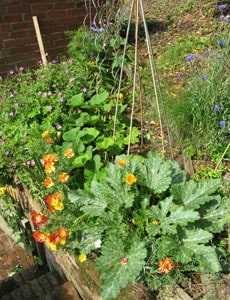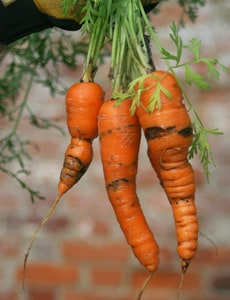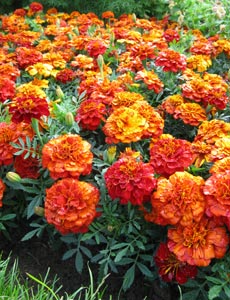
Companion Planting Guide
Companion planting is all about creating plant communities which have mutual benefits to each other. It can be an organic way to protect your crops from pests or it could help improve pollination of fruit and vegetable plants. Although there is limited scientific research surrounding companion gardening, many gardeners find it extremely beneficial to their plant’s performance. In this article we've put together the best known partnerships in flowers, herbs and vegetables to help you improve the health of your garden plants without needing to resort to pesticides. Take a look at our companion planting chart below.
Companion planting hints and tips
- Avoid monocultures. This is where the same type of plant is grown en masse or in rows. Monoculture makes it much easier for pests and diseases to find their favourite plants and then spread quickly.
- Use tall plants such as peas or sweet corn to create partially shaded conditions for crops prone to bolting, such as coriander, lettuce and spinach.
- Plant herbs throughout the garden and vegetable plot, as most have strongly scented leaves which help repel insects.
- Try intercropping. This is where fast-growing crops such as lettuce or radishes are sown between widely spaced rows of slower-growing crops such as Brussels Sprouts or parsnips. It utilises the space available and helps prevent weeds growing (weeds take nutrients, light and water, and spread disease).
- Plant lots of insect-friendly or bird-friendly plants, either amongst your crops or nearby. They attract natural predators such as birds which eat slugs, hoverflies which eat aphids and bees which pollinate your crops. Read our wildlife-friendly plants guide for more helpful information.
- Take care with some companion plants such as mint - these are fast-growing plants and will quickly smother your crop. Grow mint in containers to keep it under control.
Companion planting chart
| Companion plant 1 | Companion plant 2 | How does it work |
|---|---|---|
| Cabbage, kale, cauliflower | Nasturtium | Plant Nasturtiums as a sacrificial crop. Cabbage white butterflies will lay their eggs on Nasturtium plants, keeping caterpillars away from your Brassicas. |
| Cabbage, kale, cauliflower | Mint | Mint helps to deter flea beetles, which chew irregular holes in the leaves. |
| Courgette | Calendula (English Marigold) | Calendula flowers are highly attractive to pollinating insects which will in turn pollinate your courgette flowers. |
| Broad beans | Summer savory | Summer savory helps to repel blackfly, a common pest of broads beans. |
| Carrot | Spring onions | Sow spring onions amongst your carrots - the smell of onion deters carrot root fly. The smell of carrots also deters onion fly from onions. |
| Carrot | Leek | The smell of leeks deters carrot root fly. The smell of carrots also helps deter leek moth from leeks. |
| Carrot | Mint | The aromatic leaves of mint help confuse carrot root fly, who find their host through scent. |
| Chrysanthemum | Chives | The onion scent will deter aphids. |
| French /Runner beans | Nasturtium | Plant Nasturtiums as a sacrificial crop - aphids love them and this will lure them away from your runner beans/French beans. |
| Onion sets | Mint | The aromatic leaves of mint help to confuse and deter onion fly. |
| Radish | Mint | Mint helps to deter flea beetles, which chew irregular holes in the leaves. |
| Roses | Garlic | The smell of garlic helps to deter aphids. |
| Roses | Mint, Chives , Thyme | The strong scent of these herbs deters aphids and blackfly. |
| Runner beans | Sweet peas | Sweet peas will attract pollinating insects which will in turn help to pollinate your bean flowers. |
| Sunflower | Chives | The onion scent will deter aphids. |
| Tomatoes | Mint | The smell of mint deters aphids and other pests. |
| Tomatoes | French Marigold (Tagetes patula) | The pungent smell of French marigolds deters whitefly. |
| Tomatoes | Chives | The onion scent will deter aphids. |
| Tomatoes | Basil | Basil reportedly improves tomato flavour and the strong scent of their leaves also deters aphids. A perfect partnership in the kitchen too! |
Quick Links:

Plant flowers such as Calendula or cornflowers amongst your crops to attract pollinating insects, which will help the flowers set fruit.

Sow spring onions amongst your carrots - the smell of onion deters carrot root fly. The smell of carrots also deters onion fly from onions.

The pungent smell of French marigolds deters whitefly from your tomato plants.

Written by: Sue Sanderson
Plants and gardens have always been a big part of my life. I can remember helping my Dad to prick out seedlings, even before I could see over the top of the potting bench. As an adult, I trained at Writtle College where I received my degree, BSc. (Hons) Horticulture. After working in a specialist plantsman's nursery, and later, as a consulting arboriculturalist, I joined Thompson & Morgan in 2008. Initially looking after the grounds and coordinating the plant trials, I now support the web team offering horticultural advice online.
Sign Up For Exclusive Special Offers




© 2025 Thompson & Morgan. All rights reserved. A division of Branded Garden Products Limited.



